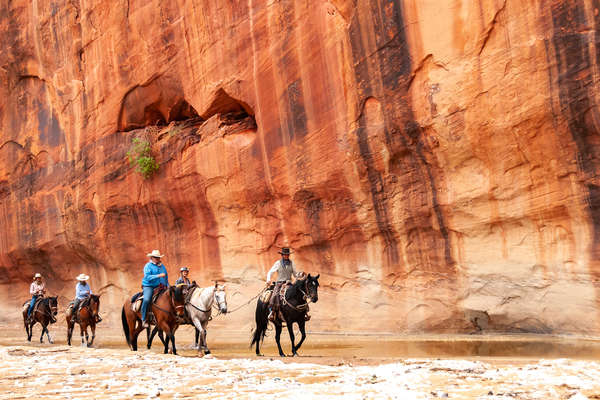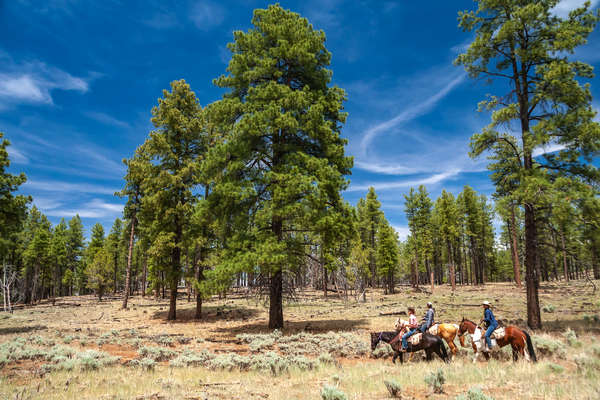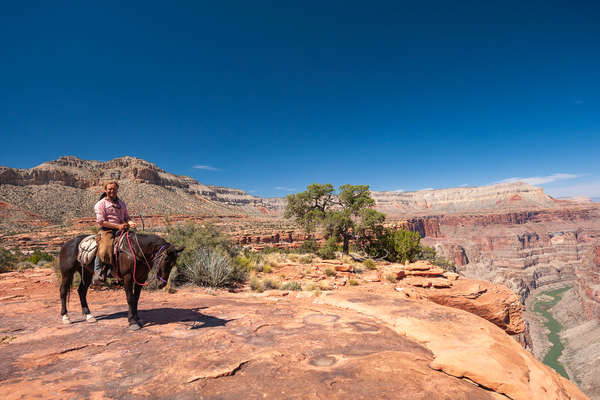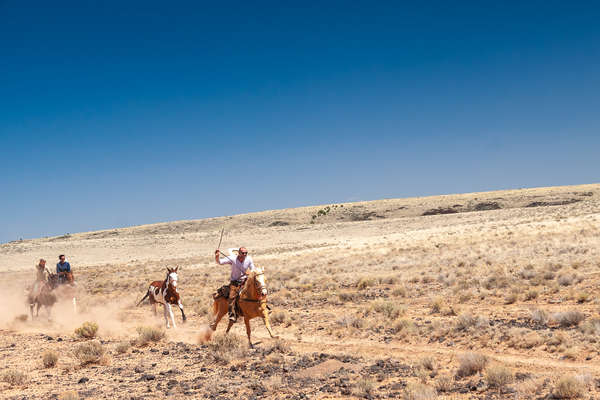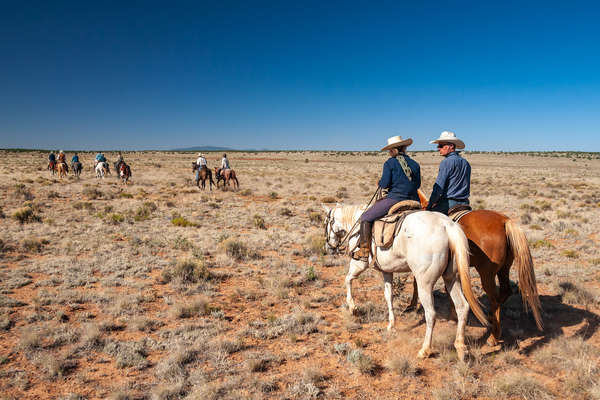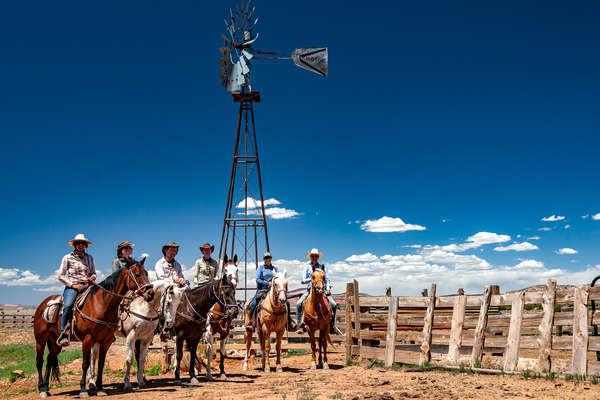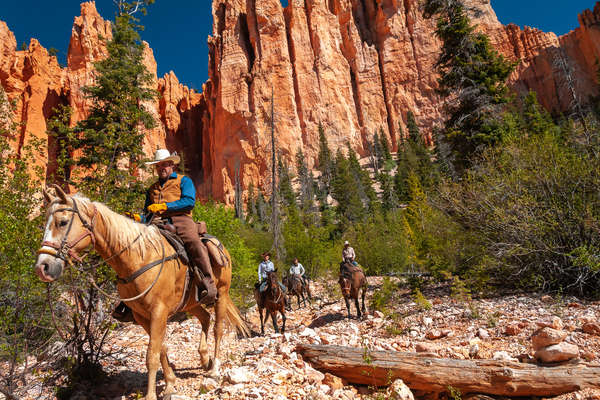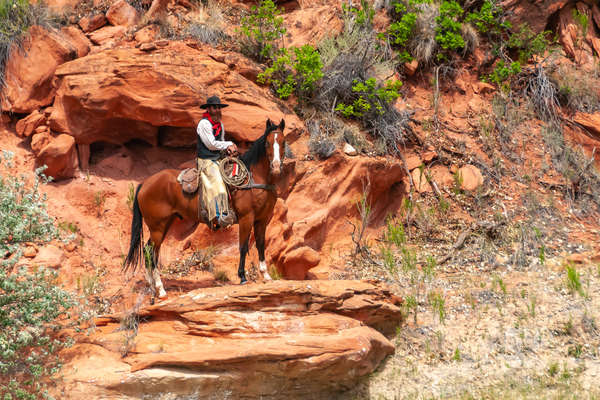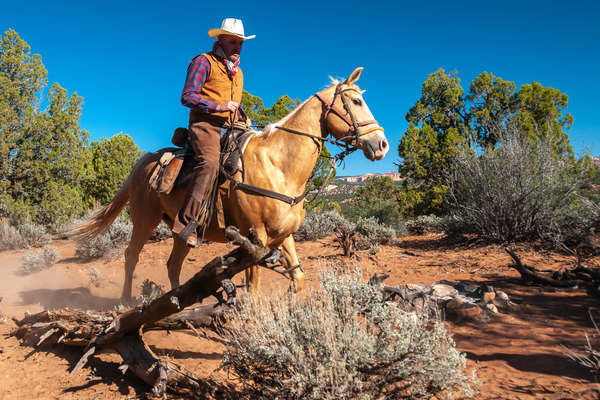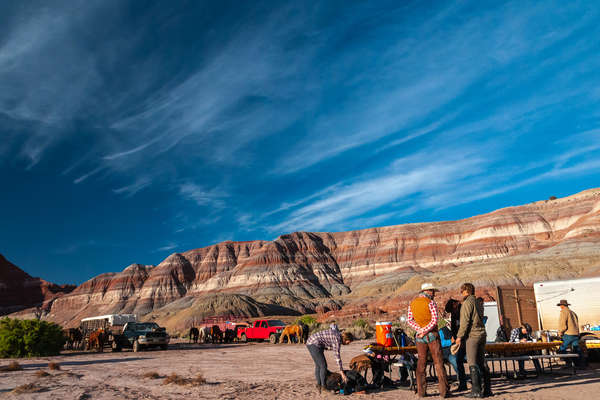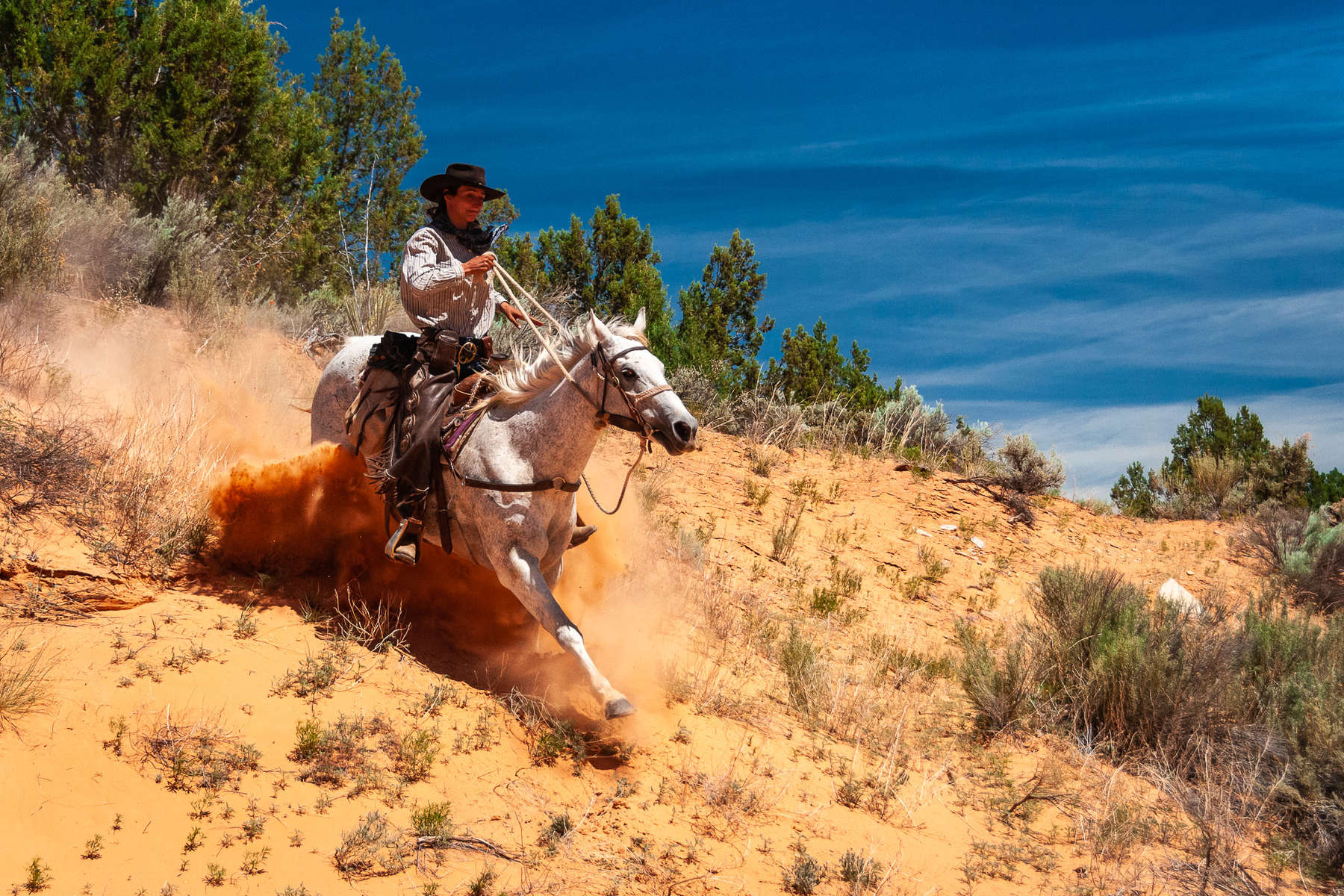
An incredible trail ride across the border between Utah and Arizona. Wide open spaces contrast with narrow canyons on this incredible horseback trail through the old Wild West. This extended version of the classic Three Park Trail offers the possibility to spend more days in the saddle and visit some of the most impressive parks in the area.
Book now
Print the details for this ride
Trail Riding
15 days / 9 days riding
From £4,008
From the horse’s mouth
Itinerary
Highlights
- Visit some of the greatest natural wonders of the West
- Cowboys, canyons and prairies .... the pure Old Wild West!
- Experience breathtaking canters towards infinite horizons
- Be welcomed into this cowboy family and leave as friends.
- Cowboys, canyons and prairies .... the pure Old Wild West!
- Experience breathtaking canters towards infinite horizons
- Be welcomed into this cowboy family and leave as friends.
Dates & prices
Price details
- International flights are not included.
- Groups comprise of 6 - 12 international riders plus guides
- If you sign up to the ride as a solo rider and there are no other riders likely to share your room in St George, you will be charged a single room supplement of approx. £135/€150/$160. You will then be reimbursed if a sharer is found for you at a later date.
- Single tent supplement on the ride: £75/€70/$65. This will not be invoiced if you are willing to share.
- Rider weight limit: 100 kg/220 lbs/15,7 stones. Riders weighing more than 90 kg should contact us before booking.
- An electronic travel authorisation (ESTA) is required to enter the USA. It is your responsibility to organise this. Please visit https://esta.cbp.dhs.gov/ and contact us if you need help.
Please Note
The itinerary may be modified at anytime for security reasons, meteorological or events beyond our control such as blocked roads, rivers in flood, drought, strikes and local holidays. Equus Journeys, our local partners and their local guides will always strive to find the best solution and will alter the itinerary as needed.
The names of the hotels and accommodation are given for information only and depending on availability, they may be modified without notice and replaced by another of a similar standard.
- Groups comprise of 6 - 12 international riders plus guides
- If you sign up to the ride as a solo rider and there are no other riders likely to share your room in St George, you will be charged a single room supplement of approx. £135/€150/$160. You will then be reimbursed if a sharer is found for you at a later date.
- Single tent supplement on the ride: £75/€70/$65. This will not be invoiced if you are willing to share.
- Rider weight limit: 100 kg/220 lbs/15,7 stones. Riders weighing more than 90 kg should contact us before booking.
- An electronic travel authorisation (ESTA) is required to enter the USA. It is your responsibility to organise this. Please visit https://esta.cbp.dhs.gov/ and contact us if you need help.
Please Note
The itinerary may be modified at anytime for security reasons, meteorological or events beyond our control such as blocked roads, rivers in flood, drought, strikes and local holidays. Equus Journeys, our local partners and their local guides will always strive to find the best solution and will alter the itinerary as needed.
The names of the hotels and accommodation are given for information only and depending on availability, they may be modified without notice and replaced by another of a similar standard.
Price includes
Support Team
1 English-speaking horse guide
Logistic
1 horse equipped with saddle and bridle per rider
1 groom
1 cook
1 vehicle and driver
1 local team
1 groom
1 cook
1 vehicle and driver
1 local team
Inland transports
Private bus as described in the itinerary
Accommodation
2 person tents and foam mattress
Double/3-bed room in hotel standard 2/3* in St George
Double/3-bed room in hotel standard 2/3* in St George
Meals
Full board from dinner on D2 to breakfast on D13 (except dinner on rodeo day)
Extras
Gratuity
Price doesn't include
Meals
Beverage and personal extra
Dinner on rodeo day
Meals in St George
Dinner on rodeo day
Meals in St George
Transports
International flights bookable on request
Visa fees (ESTA) which must be arranged in advance
Airport transfers from/to your St George hotel
Visa fees (ESTA) which must be arranged in advance
Airport transfers from/to your St George hotel
Insurance
Cancellation and travel insurances are not included. Please note that insurance is mandatory. We recommend to take out an insurance policy as soon as your travel is booked in case of cancellation.
Optional
Accommodation
Single room supplement in St George
Equestrian info
Horses
Working horses including mustangs, paints and quarter horses. They are well trained, forward going, confident and independent.
Guide & local team
The Heaton family will be your hosts for this adventure.
The father, Mel, used to be lead guide and is now Camp manager.
Justin, his son, is a true cowboy at heart.
Val and her husband Cade help with guiding and with logistics. Val is a French woman who met Cade on the trail years ago, and fell in love with both cowboy and country!
The father, Mel, used to be lead guide and is now Camp manager.
Justin, his son, is a true cowboy at heart.
Val and her husband Cade help with guiding and with logistics. Val is a French woman who met Cade on the trail years ago, and fell in love with both cowboy and country!
Minimum riding ability
Minimum riding ability
You need to be an experienced rider who is used to riding across varied terrain for several hours. There are some long riding days and the terrain can be very demanding. You must be physically fit and have an adventurous mindset.
Rider weight limit: 100 kg/220 lbs/15,7 stones. Riders weighing more than 90 kg should contact us before booking.
Rider weight limit: 100 kg/220 lbs/15,7 stones. Riders weighing more than 90 kg should contact us before booking.
Pace
There are long stretches of walk as the terrain is very demanding and horses need to complete the whole ride, but there are opportunities for some canters across the plains and prairies.
Tacking ability and participation
Everyone is expected to assist in caring for the horses (tacking up, un-tacking etc) and setting up camp (erecting tents and helping prepare meals).
Trip conditions and Requested experience
You must be physically fit. There are some long days (up to 8 hours riding) at the start of the ride. The ground is uneven and you have to be able to trust your horse to find his way. On some occasions you may be asked to dismount and lead your horse on foot. This ride is not recommended for riders who are scared of heights. In addition to the physical demands of the trail, you need to be able to help with all camp chores (set up tents, break down camp, carry bags and boxes, help with meals....)
Please check with us before booking if you have any medical conditions as you will be far from medical help.
You should have previous experience of a long trail ride over several days and it is advantageous if you have experience of remote camping too.
Please check with us before booking if you have any medical conditions as you will be far from medical help.
You should have previous experience of a long trail ride over several days and it is advantageous if you have experience of remote camping too.
Equestrian equipment
Western saddles and bridles.
Saddlebags are provided.
We recommend our riders to wear a helmet to the correct standard and you should bring your own to ensure a proper fit.
Saddlebags are provided.
We recommend our riders to wear a helmet to the correct standard and you should bring your own to ensure a proper fit.
Travel info
Comfort
Whilst on the trail you camp in large, comfortable two-man tents with camp beds and mattresses provided. You should take your own sleeping bag, or you can rent one with the outfitter (see dates and prices). Everyone's participation is expected when it comes to set up and break down camp.
There is limited access to water on the trail, there will be some water accessible to wash but not every night. A toilet tent will be set up.
This is a vehicle-supported trip.
You can charge certain devices on the generator, but this is shared between all riders.
There is limited access to water on the trail, there will be some water accessible to wash but not every night. A toilet tent will be set up.
This is a vehicle-supported trip.
You can charge certain devices on the generator, but this is shared between all riders.
Meals
The food is always abundant and of very good standards for a camping trail.
- Copious breakfasts with a choice of sweet and savoury options
- Picnic lunches
- Hot meals at dinner (meat, potatoes or pasta, vegetables and salad).
Water and lemonade will be available at Camp.
Alcohol is not provided but you are welcome to bring your own drink. Please note Utah is a Mormon state and alcohol is not readily available. Your hosts, Justin and Mel Heaton, are Mormons themselves and do not drink.
Please make sure to advise us in advance of any dietary requirements you may have.
- Copious breakfasts with a choice of sweet and savoury options
- Picnic lunches
- Hot meals at dinner (meat, potatoes or pasta, vegetables and salad).
Water and lemonade will be available at Camp.
Alcohol is not provided but you are welcome to bring your own drink. Please note Utah is a Mormon state and alcohol is not readily available. Your hosts, Justin and Mel Heaton, are Mormons themselves and do not drink.
Please make sure to advise us in advance of any dietary requirements you may have.
Climate
The climate is that of a mid-latitude desert with relatively moderate temperatures. Annual temperatures average 20°C.
- June and May are very dry and hot (15-35°C, sometimes 35°C+) with cool nights.
- Summers (June-September) are long, hot and sunny (c. 30°C). Nights average 10-15°C. A few showers and the occasional thunder storm are possible.
- Expect extremely hot weather in Las Vegas - up to 45°C in the summer.
- June and May are very dry and hot (15-35°C, sometimes 35°C+) with cool nights.
- Summers (June-September) are long, hot and sunny (c. 30°C). Nights average 10-15°C. A few showers and the occasional thunder storm are possible.
- Expect extremely hot weather in Las Vegas - up to 45°C in the summer.
Tips
Tips are compulsory in USA. They are included in the cost of the ride. Expect to leave a tip at restaurants and bars in St George.
Packing list
Head
- Equus Journeys strongly recommend that you wear a riding helmet and that you take your own to ensure a correct fit. There are many lightweight options available nowadays
- Sunhat for when not riding
- Sunglasses - with a cord attached so they don't fly off when riding
- Buff or bandana
- Warm hat for cold nights when camping
Upper body
- Thermals (long or short sleeved)
- Long sleeved shirts provide protection from the sun and are an extra layer
- T-shirts
- Lightweight fleece or jumper
- Warm fleece or jumper (and a spare in case one gets wet)
- Warm and waterproof jacket - it can rain at any time of year and the evenings can be cold
- Swimming costume - for swimming/bathing in rivers/hot springs
Legs
- Lightweight, comfortable riding trousers or jodhpurs - we recommend riding in them at home before taking them on holiday to ensure they don't rub
- Thermals
- Casual trousers for the evenings, such as jeans or tracksuit bottoms
- Waterproof over trousers
Hands and Feet
- Comfortable riding boots. We recommend short boots with half chaps but you may wish to take long chaps as an extra layer against inclement weather. We don't recommend taking your favourite long leather boots in case they get damaged
- Waterproof shoes/boots can be useful for abundant dew in the mornings or when it rains
- Trainers or equivalent light shoes for moving around the camp in the evenings
- Several pairs of warm, thick socks
- Gloves - your hands are particularly exposed to the sun, cold or rain whilst riding. Waterproof gloves can be particularly useful
Nightwear
- Sleeping bag. You need at least a comfort factor down to minus 5 celsius, but would recommend at least minus 8 or 10 celsius
- Sleeping bag liner - silk, cotton or fleece - adds an extra layer
- Pyjamas or tracksuits or thermals for sleeping in
Other useful items
- Towels - camping ones will both dry and pack more easily
- Camera and high capacity memory card. Spare battery
- Bumbag for carrying your camera and small items whilst riding
- Headtorch or small torch for moving around camp at night - bring spare batteries and bulbs
- Water bottle (there is no opportunity to refill water at lunch so bring 4L)
- Swiss army knife
- Biodegradable wet wipes or equivalent (for when washing facilities aren't available)
- Toilet paper and a lighter to burn it with
- Small plastic bags for rubbish
- Ear plugs and eye mask (for light sleepers)
- Zipbags to preserve fragile items from dust or rain
- A pair of leather laces could be useful to tie a jacket behind your saddle.
- Power bank
Medical kit
- Any medication you regularly take
- Sunscreen and lip balm - should be high factor
- Insect repellent, preferably containing deet
- Blister plasters in case of any rubs
- Antiseptic cream, plasters, aspirin, anti-histamine, insect-bite salve etc...
- Spare prescription glasses/contact lenses
- Eye drops
- Imodium or similar anti-diarrhoea medication
- Re-hydration sachets if you feel you will need them
- Antiseptic wipes
- Handwash gel
Our Recommendations
- We recommend you bring your own enamel/reusable cup on this trail, to avoid over use of paper cups. The local team uses proper cutlery and plates, but non reusable cups.
- Please don't take a hard sided suitcase. Your luggage should be soft sided.
- Backpacks cannot be worn whilst riding. We recommend a small bumbag or a coat with pockets so that you can carry small items with you during the day (passport, camera, sunscreen, lipbalm etc)
- We recommend travelling in your riding boots and carrying your hat and some riding clothes in your hand luggage - then if your luggage goes astray you are still able to ride!
- We recommend taking a copy of your passport and insurance documents with you in case you lose your originals
- Please take your rubbish home with you. There are no recycling facilities, so take your used batteries, aerosols etc back home and dispose of them appropriately. Try to leave excess packaging material at home before travelling
- If you prefer travelling in a "light way" please choose a biodegradable soap or washing powder/liquid.
In your hold luggage
- Any liquids, such as shampoo, moisturiser, deodorant unless they are less than 100ml and all bottles can fit in a small, clear, plastic ziplock bag. We recommend biodegradable washing products where possible.
- Swiss army knife (or equivalent)
- Equus Journeys strongly recommend that you wear a riding helmet and that you take your own to ensure a correct fit. There are many lightweight options available nowadays
- Sunhat for when not riding
- Sunglasses - with a cord attached so they don't fly off when riding
- Buff or bandana
- Warm hat for cold nights when camping
Upper body
- Thermals (long or short sleeved)
- Long sleeved shirts provide protection from the sun and are an extra layer
- T-shirts
- Lightweight fleece or jumper
- Warm fleece or jumper (and a spare in case one gets wet)
- Warm and waterproof jacket - it can rain at any time of year and the evenings can be cold
- Swimming costume - for swimming/bathing in rivers/hot springs
Legs
- Lightweight, comfortable riding trousers or jodhpurs - we recommend riding in them at home before taking them on holiday to ensure they don't rub
- Thermals
- Casual trousers for the evenings, such as jeans or tracksuit bottoms
- Waterproof over trousers
Hands and Feet
- Comfortable riding boots. We recommend short boots with half chaps but you may wish to take long chaps as an extra layer against inclement weather. We don't recommend taking your favourite long leather boots in case they get damaged
- Waterproof shoes/boots can be useful for abundant dew in the mornings or when it rains
- Trainers or equivalent light shoes for moving around the camp in the evenings
- Several pairs of warm, thick socks
- Gloves - your hands are particularly exposed to the sun, cold or rain whilst riding. Waterproof gloves can be particularly useful
Nightwear
- Sleeping bag. You need at least a comfort factor down to minus 5 celsius, but would recommend at least minus 8 or 10 celsius
- Sleeping bag liner - silk, cotton or fleece - adds an extra layer
- Pyjamas or tracksuits or thermals for sleeping in
Other useful items
- Towels - camping ones will both dry and pack more easily
- Camera and high capacity memory card. Spare battery
- Bumbag for carrying your camera and small items whilst riding
- Headtorch or small torch for moving around camp at night - bring spare batteries and bulbs
- Water bottle (there is no opportunity to refill water at lunch so bring 4L)
- Swiss army knife
- Biodegradable wet wipes or equivalent (for when washing facilities aren't available)
- Toilet paper and a lighter to burn it with
- Small plastic bags for rubbish
- Ear plugs and eye mask (for light sleepers)
- Zipbags to preserve fragile items from dust or rain
- A pair of leather laces could be useful to tie a jacket behind your saddle.
- Power bank
Medical kit
- Any medication you regularly take
- Sunscreen and lip balm - should be high factor
- Insect repellent, preferably containing deet
- Blister plasters in case of any rubs
- Antiseptic cream, plasters, aspirin, anti-histamine, insect-bite salve etc...
- Spare prescription glasses/contact lenses
- Eye drops
- Imodium or similar anti-diarrhoea medication
- Re-hydration sachets if you feel you will need them
- Antiseptic wipes
- Handwash gel
Our Recommendations
- We recommend you bring your own enamel/reusable cup on this trail, to avoid over use of paper cups. The local team uses proper cutlery and plates, but non reusable cups.
- Please don't take a hard sided suitcase. Your luggage should be soft sided.
- Backpacks cannot be worn whilst riding. We recommend a small bumbag or a coat with pockets so that you can carry small items with you during the day (passport, camera, sunscreen, lipbalm etc)
- We recommend travelling in your riding boots and carrying your hat and some riding clothes in your hand luggage - then if your luggage goes astray you are still able to ride!
- We recommend taking a copy of your passport and insurance documents with you in case you lose your originals
- Please take your rubbish home with you. There are no recycling facilities, so take your used batteries, aerosols etc back home and dispose of them appropriately. Try to leave excess packaging material at home before travelling
- If you prefer travelling in a "light way" please choose a biodegradable soap or washing powder/liquid.
In your hold luggage
- Any liquids, such as shampoo, moisturiser, deodorant unless they are less than 100ml and all bottles can fit in a small, clear, plastic ziplock bag. We recommend biodegradable washing products where possible.
- Swiss army knife (or equivalent)
Sustainable tourism
- Travel light. It's a little known fact, but the lighter you pack, the better for the environment as heavy bags will produce higher emissions (when flying a plane or driving a car!).
- Reduce plastic waste. Take your favorite reusable bottle with you. Avoid single-use bags, cups, or straws.
- Preserve nature. Always take your rubbish with you during the ride and recycle them. Leave all the flowers or plants as you found them, and never get too close when observing wildlife. Make sure to use eco-friendly products such as body wash or laundry detergent (if camping) to protect both your skin and the environment.
- Choose your experiences carefully. Respect animal life by not participating in any activities that abuse wild animals (shows, elephant rides, etc.).
- Support local populations. Buy local handicrafts, be respectful of customs, and learn about the culture of local communities.
- Share! Raise awareness among your family and friends about sustainable tourism.
For more information please see this page.
Did you know?
Did you know?
The Stetson : A Legendary Hat
This is an indispensable element of your horseback riding holiday or trail ride in the United States!
The stetson was invented by the American John B. Stetson in the 1860s.
It was during a stay in the American West that he invented a felt hat with very wide edges, perfectly suited to the cowboys lifestyle.
Felt is waterproof and resistant: it is better suited to the climate of the West than the traditional straw hats and its large brims protect the eyes and the neck from the sun.
This hat was first sold in Central City, Colorado under the name "Boss of the Plains". It was later renamed "stetson" in reference to its inventor.
On the blog
"There’s an art to being a cowgirl. It can mean broken nails, sweaty hair, and a dirty face. Some of us have mastered that art better than others - or so I’m thinking as I look at our guide, Val, picture-perfect in her nice chaps and vintage cowgirl shirt. Me? I’ve collected a fresh set of cuts and bruises, torn holes in the two pairs of breeches I’ve packed, and my shirt is more sweat and dirt than fabric. Oh well.
[...]
Each ride is more beautiful than the last. The route is clearly designed to avoid crowds, and we’re treated to some breathtaking viewpoints with no one else in sight. The final day is the highlight: after days of riding through endless sagebrush, the land suddenly drops away, revealing the vastness of the Grand Canyon’s North Rim. Just us, the horses, and this immense geological wonder. It’s almost too much to take in. No one says a word. I catch another guest quietly wiping away a tear."
Read Iris' ride report on the blog: click here.
Customer reviews
Customer reviews
All of our reviews are real, honest opinions from riders who have recently travelled with us. Upon their return, our riders will receive an email inviting them to share their experiences from their trip. Good or bad, each review will be published on our website, provided that they respect our editorial guidelines.

